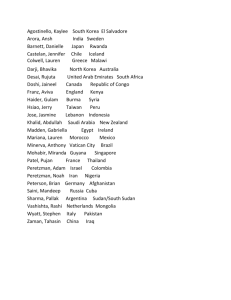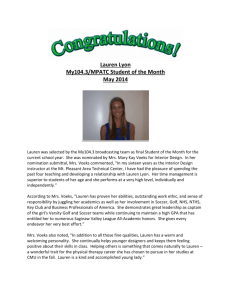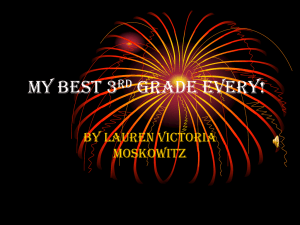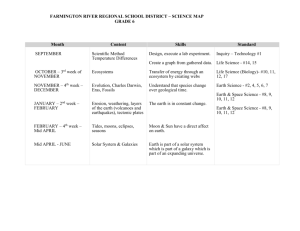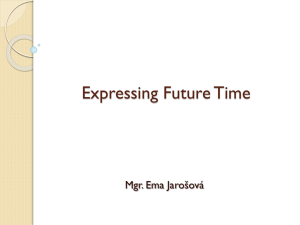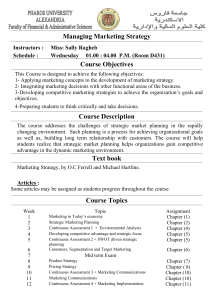Social class in England in the 21st century - estra
advertisement
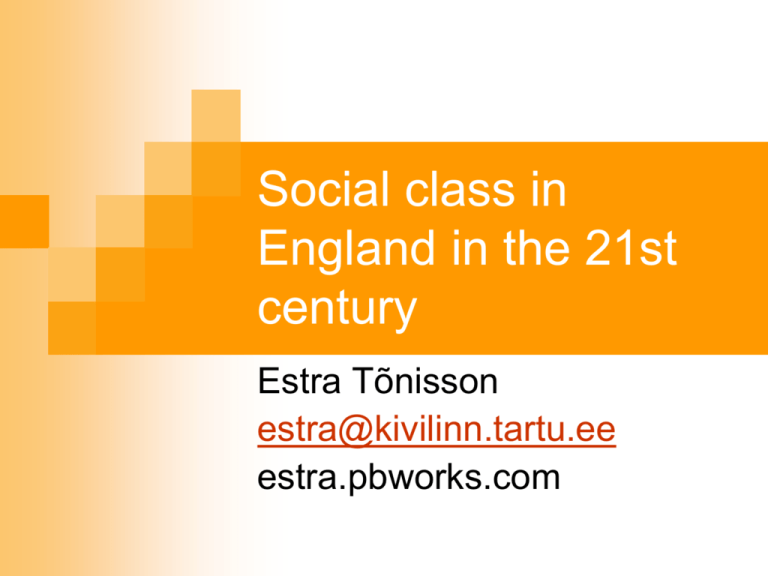
Social class in England in the 21st century Estra Tõnisson estra@kivilinn.tartu.ee estra.pbworks.com It's said that the British are obsessed with class, but does the traditional hierarchy of ‘working’, ‘middle’ and ‘upper’ class really exist anymore? And does social class even matter in 21st century Britain? What is social class? one of the groups into which people in a society are divided according to their manners, family background, education, job, or income BBC’s Frost Report (1967-68) An Understanding of Class Some class stereotypes Essex man/woman – in 1980s Working class Well off Low intelligence, votes Conservative Was used as a political term Women were vulgar, loud, scantily dressed A lot of jokes made about them Chavs In 2000-2001 Young people Poorly educated Working class origin Dress casually in designer sportswear and vulgar jewellery A chavette is a female chav Typical chav – Vicky Pollard Vicky Pollard is a fictional character from the British comedy TV series Little Britain, which aired on BBC. She is portrayed by Matt Lucas, and portrays the stereotypical chav - being a teenage mother and juvenile delinquent. Vicky is commonly known for her inarticulate and incredibly fast speech and incessant gossip. Vicky in bootcamp Another chav - Lauren Lauren Alesha Masheka Tanesha Felicia Jane Cooper is a fictional character in The Catherine Tate Show. Lauren is one of the show's main characters and is played by Catherine Tate. Lauren is a fifteen to sixteen year old schoolgirl with a surly attitude and was most widely known for her phrase "Am I bovvered?" Lauren on Beyonce Sloan rangers, Sloanies Upper class and fashion-conscious, conventional young men and women who came ‘up from the country’ to live in London after finishing school ‘Middle Englanders’ predominantly middle-class, middleincome section of British society living mainly in suburban and rural England Xenophobic, homophobic, anti-welfare, insular, selfish, anti-Europe They are important voters, so called ‘swinging voters’ Class divisions – Upper classes People with inherited wealth, defined by their wealth, education and their pastimes (hunting, shooting, fishing, horse riding) Don’t work for money, but do a lot of charity work NOBILITY – privileged class, holding hereditary classes A PEER – one of 5 degrees (duke, marquise, earl, viscount, baron) GENTRY – the landed people, lack hereditary titles, have some political power locally Middle classes the social group between the upper and working classes, including professional and business people and their families 50-60% of white collar workers Industrialists, shop owners, business people Working class the social group consisting of people who are employed for wages, especially in manual or industrial work Agricultural work Mine and factory workers (‘blue-collar wages’) The fall and rise of the class There are three periods – Mid 1950s to mid 70s – very important Mid 1970s to mid 90s – decline Mid 1990s – new interest Social grades Grade Social class Chief income earner's occupation A 4% upper middle class Higher managerial, administrative or professional. B 23% middle class Intermediate managerial, administrative or professional C1 29% lower middle class Supervisory or clerical and junior managerial, administrative or professional C2 21% skilled working class Skilled manual workers D 5% working class Semi and unskilled manual workers E 18% Those at the lowest levels of subsistence Casual or lowest grade workers, pensioners and others who depend on the welfare state for their income Keeping Up Appearances Centred on the life of eccentric, social-climbing snob Hyacinth Bucket (who insists that her surname is pronounced Bouquet), the sitcom portrays a social hierarchy-ruled British society. It jokes about a small obsessive world where a determined snobbish middle class woman desperately and continually looks for opportunities to climb the social ladder, despite being wedged between a working class background and upper class aspirations.
